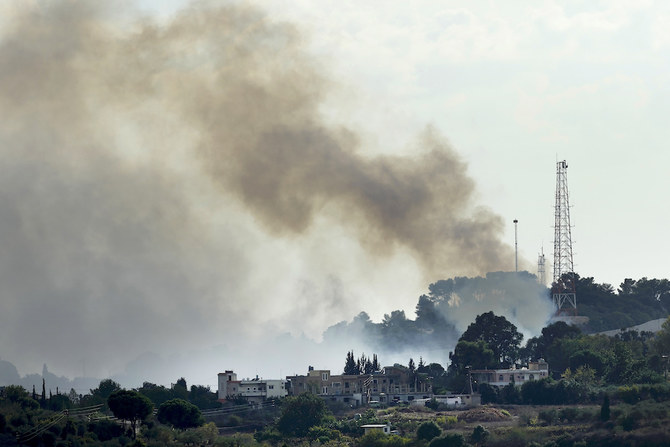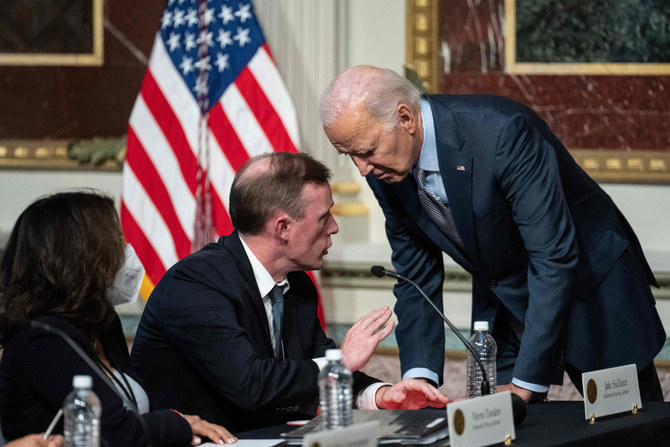WASHINGTON: Top US officials warned on Sunday that the war between Israel and militant group Hamas could escalate, as American warships headed to the area amid growing clashes on the country’s northern border with Lebanon.
Israel has unleashed a ferocious bombing campaign over Gaza in retaliation for unprecedented attacks inside Israel by Hamas eight days ago that killed some 1,300 Israelis, mostly civilians.
Gaza authorities say more than 2,670 people have been killed there, a quarter of them children. Casualties are expected to rise as Israel prepares for a ground assault on the tiny, densely populated enclave that could start within days.
The conflict has sent tensions soaring.
“There is a risk of an escalation of this conflict, the opening of a second front in the north and, of course, Iran’s involvement,” White House national security adviser Jake Sullivan told CBS.
US Defense Secretary Lloyd Austin announced deployment of a second aircraft carrier group late on Saturday, calling it a sign of “our resolve to deter any state or non-state actor seeking to escalate this war.”
The aircraft carrier the Dwight Eisenhower will join a small fleet including the massive Gerald R. Ford aircraft carrier in the eastern Mediterranean.

“Iran is the elephant in the room,” a US official briefed on the situation said about the increasing military presence. “The carriers are accompanied by warships and attack planes. Every effort is being made to stop this from becoming a regional conflict.”
Iran Foreign Minister Hossein Amirabdollahian warned on Sunday his country could act, telling al Jazeera that it had conveyed a message to Israeli officials that “if they do not cease their atrocities in Gaza, Iran cannot simply remain an observer.”
“If the scope of the war expands, significant damages will also be inflicted upon America,” he warned.
Violence on Israel’s northern border is already escalating. Lebanon’s Iran-backed Hezbollah fighters launched attacks on Israeli army posts and a northern border village on Sunday; Israel retaliated with strikes in Lebanon.
The US is urging Israel to hold off on its ground offensive to allow humanitarian efforts for Gaza’s residents trapped in the area, several US officials said.
Sullivan discussed a new weapons package for Israel and Ukraine that would be “significantly higher” than the previously reported $2 billion. He told CBS that President Joe Biden planned to have intensive talks on the package this week with the US Congress, which has been hobbled by Republicans’ struggles to pick a new speaker of the House of Representatives.
Senate majority leader Chuck Schumer, speaking in Tel Aviv on Sunday, said the US Senate could move first to approve more funding for Israel. “We’re not waiting for the House (of Representatives),” he said.
Republican Senator Lindsey Graham said on Sunday he is traveling to the region with other senators in coming days to push continued negotiations between Saudi Arabia and Israel.
Graham said he intended to introduce a bill that would “allow military action by the United States in conjunction with Israel to knock Iran out of the oil business” if Iran attacks Israel.
Humanitarian crisis
US government officials also said they are mobilizing to help alleviate the humanitarian crisis in Gaza, anticipating a brutal ground offensive.
Israeli officials have made clear it will not be an easy or swift campaign. It faces the challenge that scores of hostages seized by Hamas on Oct. 7 could now be held in a warren of underground tunnels, which its soldiers must clear to destroy Hamas.
Biden, in a message posted on X, formerly Twitter, said: “We must not lose sight of the fact that the overwhelming majority of Palestinians had nothing to do with Hamas’ appalling attacks, and are suffering as a result of them.”
The US has appointed former ambassador to Turkiye David Satterfield as a special envoy for Middle East humanitarian issues. His focus would be on the Gaza crisis, “including work to facilitate the provision of life-saving assistance to the most vulnerable people and promote the safety of civilians,” the State Department said.
“We’re pushing Israel to delay any action on the ground,” said one US official briefed on the situation. Asked directly if the US was pushing Israel to delay its ground war for civilians, Sullivan told NBC “we are not interfering in their military planning or trying to give them instructions or requests specific to their military planning.”
However, he added, the US is telling Israel any actions should follow the law of war, and that “civilians should have a real opportunity to get to safety.”
US Secretary of State Antony Blinken said on Sunday that the Egyptian-controlled border crossing into Gaza would reopen and the US was working with Egypt, Israel and the United Nations to get assistance through it.
Hundreds of tons of aid from several countries have been held up in Egypt’s Sinai peninsula for days pending a deal for its safe delivery to Gaza and the evacuation of some foreign passport holders through the Rafah crossing.
Sullivan told NBC, “so far, we have not been able to get American citizens through the border crossing and I’m not aware of anyone else being able to get out at this time.”
He added that he wanted to make sure the civilian population that remained in Gaza had access to food, water and safe shelter, and in an interview with CNN said Israeli officials had recently “turned the water pipe back on in southern Gaza.”
Republican Senator Lindsey Graham told Reuters that the Israel assault on Gaza would be bloody.
“I expect urban warfare on steroids,” he said. “There will be cries from the international community for Israel to stand down, but I think it’s imperative that we give Israel the time and space to destroy Hamas.”















